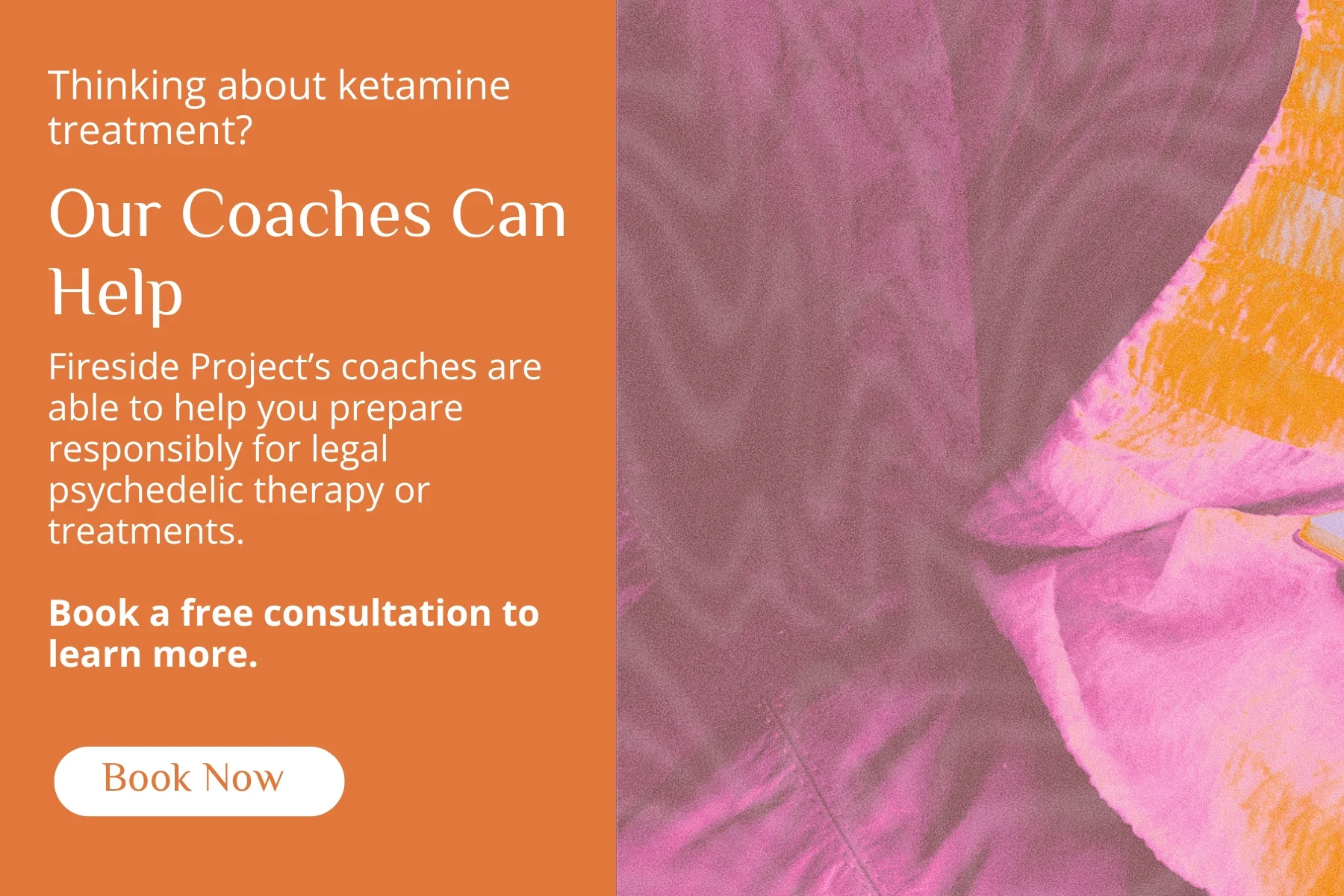Ketamine Therapy & Integration: What Our Callers Say
An Intro to Ketamine Therapy
Ketamine therapy has emerged as a promising treatment for a variety of mental health disorders, including treatment-resistant depression, post-traumatic stress disorder, and anxiety disorders. Originally developed as a dissociative anesthetic, ketamine’s ability to promote rapid antidepressant effects has made it a sought-after alternative for individuals who have not found relief through conventional therapies.
However, the ketamine experience is complex. While some patients report profound therapeutic effects, others find themselves struggling with lingering psychedelic effects, dissociative states, or difficulty reintegrating their experiences into daily life. This is where integration support becomes crucial.
Common Reasons for Seeking Ketamine Therapy
Our data from Fireside Project’s Psychedelic Support Line shows that around 10% of our 25,000+ callers and texters have reached out about ketamine. While many of these are recreational users, 1 in 5, or about 2% of our overall caller volume, are seeking support related to ketamine therapy specifically.
The most common reasons people seek ketamine treatment include:
Treatment-resistant depression: Many callers have exhausted traditional antidepressant medications and talk therapy without success.
Anxiety and PTSD: Ketamine’s anxiolytic effects can offer relief from symptoms of post-traumatic stress disorder and generalized anxiety disorder.
Substance use disorders: Some individuals use ketamine in combination with psychotherapy to address alcohol use disorder and other addictive disorders.
Chronic pain management: A growing number of patients with neuropathic pain and chronic pain conditions turn to ketamine infusions as an alternative to opioid medications.
Personal growth and transformation: Beyond medical treatment, some seek ketamine therapy for its potential psychedelic effects and mystical experiences.
The Difference Between Ketamine Infusion & Ketamine-Assisted Psychotherapy
One of the biggest factors that impact the ketamine experience is the mode of administration and therapeutic setting.
Callers to Fireside Project have shared their experiences with both ketamine infusions and ketamine-assisted psychotherapy (KAP), highlighting key differences:
Ketamine Infusion Therapy: Typically conducted in a clinical setting with intravenous ketamine, lozenges, or a nasal spray, these sessions focus on the pharmacological effects of ketamine as a standalone treatment. While effective, many callers note that these sessions often lack therapeutic guidance or integration support, leaving them uncertain about how to process their experiences, or without a clear understanding of the treatment’s efficacy for a specific long-term benefit.
Ketamine-Assisted Psychotherapy (KAP): KAP combines ketamine with psychotherapy, often facilitated by a skilled therapist. This approach aims to maximize ketamine’s therapeutic potential by providing structured support before, during, and after treatment. Callers who undergo KAP tend to report that the therapeutic alliance confers greater long-term benefits.
What Our Callers Say About Integration Challenges
A significant portion of callers reaching out about ketamine therapy were either at a clinic or had just left one, indicating an immediate need for post-session support. A smaller number contacted us after virtual ketamine sessions conducted at home. Our line plays a crucial role in bridging the gap for those left without adequate integration resources.
Key takeaways from our caller experiences:
Lack of integration support: Many ketamine clinics provide little to no structured integration support, leaving patients feeling adrift post-session.
Clinical environments feel impersonal: Anecdotally, callers describe some ketamine clinics as sterile and uninviting, with nurses untrained in supporting patients undergoing psychedelic experiences.
Psychedelic effects can be disorienting: Some callers report struggling with dissociative effects, blurred vision, and difficulties returning to daily life after a session.
Many individuals reach out to Fireside Project seeking additional support to process their experiences, understand their insights, and discuss how to integrate them into their therapeutic process.
The Importance of Integration in Ketamine Therapy
Integration is a crucial component of any psychedelic treatment, including ketamine therapy. Without it, patients may struggle to make sense of their experiences or translate them into meaningful change.
Effective integration includes:
Journaling or creative expression to reflect on insights gained during ketamine treatment.
Therapeutic follow-up with a healthcare provider or mental health professional trained in psychedelic integration.
Support groups or peer discussions to share experiences and build community.
Mindfulness and grounding techniques to reorient oneself after dissociative experiences.
At Fireside Project, we recognize the potential of ketamine therapy as a transformative medicine while acknowledging the need for harm reduction and integration support. Our psychedelic peer support line serves as a compassionate, judgment-free space for individuals seeking to navigate their ketamine experiences and their aftermath.
The Psychological Risks & Addictive Potential of Ketamine
While ketamine therapy offers significant promise, it is not without risks. Ketamine is classified as a dissociative anesthetic with psychoactive effects, and its misuse can lead to dependency, cognitive impairment, and long-term psychological harm. The potential for ketamine to be habit-forming underscores the importance of proper medical supervision, therapeutic guidance, and integration support.
Recent tragedies, such as the death of actor Matthew Perry, and the increasing availability of at-home injectable ketamine, have highlighted the dangers of medical misuse of ketamine. Perry, who was vocal about his struggles with addiction, reportedly had high levels of ketamine in his system at the time of his passing. His death serves as a stark reminder that ketamine, while therapeutic in controlled settings, can pose serious risks when misused or combined with other substances.
Fireside is Here to Support You
Ketamine therapy holds immense promise as an innovative approach to treating depressive disorders, anxiety, and trauma. However, our caller data highlights a significant gap in integration support that needs to be addressed. As the field of psychedelic medicine continues to evolve, ensuring proper follow-up care and integration will be key to maximizing the benefits of ketamine treatment.
If you or someone you know is struggling to process a ketamine experience, Fireside Project is here to help. Our free, confidential peer support line provides a compassionate space to navigate the complexities of ketamine therapy and its integration into daily life.
Call or text us for support. You are not alone in your journey.
Fireside Project does not condone the use of illegal substances including psychedelics. If you choose to partake we encourage safety and awareness.



